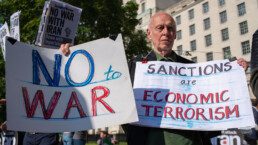Destitution should not be a tool of U.S. foreign policy.
By Jacob Batinga, Current Affairs
What right does the United States have to starve civilians to achieve political goals? Despite its obvious importance, this question is largely absent from mainstream discourse. Through economic sanctions, or economic warfare, the U.S. can unilaterally collapse economies and generate famine in foreign countries. The civilian death toll from sanctions is often equal to—and sometimes greater than—the toll from conventional warfare. Yet on both sides of the aisle, it is taken for granted that we have the “right” to impose destitution on civilian populations in order to advance our interests.

The U.S. administers two types of sanctions: primary and secondary sanctions. Primary sanctions cut off economic relations between targeted foreign entities—states, individuals, industries, or corporations—and the American economy. Secondary sanctions, also known as “extraterritorial sanctions,” are more pernicious. Secondary sanctions impose sanctions or other penalties on third parties not under the jurisdiction of the U.S. if they refuse to cease economic relations with the entity under primary sanctions. For example, the U.S. imposed both primary and secondary sanctions on the Central Bank of Iran (CBI). Therefore, the U.S. prohibits American citizens and corporations from conducting business with the bank (primary sanctions), and imposes sanctions on any foreign state, individual, or corporation that chooses to work with the CBI (secondary sanctions).
Many legal scholars and most of the world, including the European Union, maintain that these secondary sanctions clearly violate well established principles of international law, interfere with the sovereignty of foreign governments, and are ultimately illegitimate.
Recent Posts
“Arrest Now, Ask Questions Later”: Why Did L.A. ICE Agents Arrest and Jail U.S. Citizen Andrea Velez?
July 3, 2025
Take Action Now “They didn’t have vests that said ICE or anything. Their cars didn’t have license plates. … Just because of the color of our…
Trump’s Big, Beautiful Bill Is Naked Class War
July 3, 2025
Take Action Now Trump’s “Big, Beautiful Bill” trades tax cuts on millionaires for the dissolution of society.By Hamilton Nolan, In These Times…
Mayor Mamdani’s First Day, A Zero Hour Conversation With Richard Wolff
July 2, 2025
Take Action Now If elected, what would Mayor Mamdani do on his first day in City Hall? How would a democratic socialist govern as a big-city mayor?……
The U.S. Is Funding A Bloodbath At Gaza Aid Centers
July 2, 2025
Take Action Now The admin just gave $30M to GHF, the organization at the center of charges that Israel is weaponizing assistance and shooting at…




